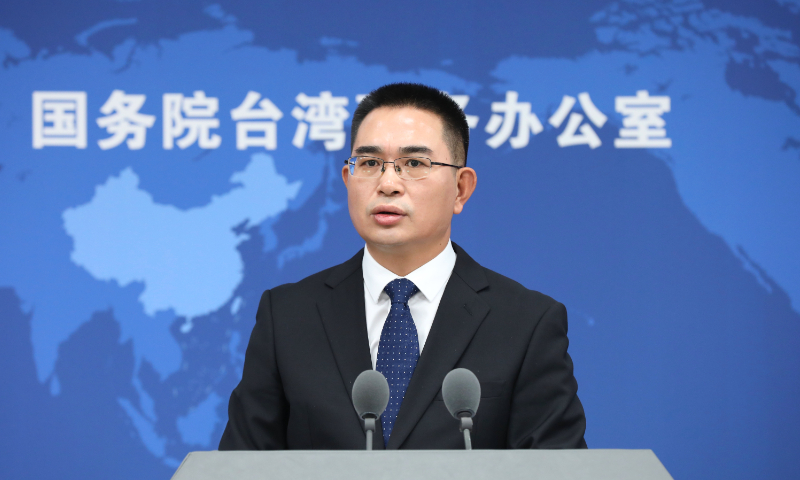
Chen Binhua, a spokesperson for the State Council's Taiwan Affairs Office, attends a press conference in Beijing, on September 13, 2023. Photo: VCG
Democratic Progressive Party (DPP) authorities on the Taiwan island have unilaterally restricted imports from the Chinese mainland on a large scale for a long time, the Taiwan Affairs Office of the State Council said on Wednesday, commenting on the mainland's extension of a probe into the Taiwan island's trade barriers on mainland products that was announced on Monday.
"The DPP authorities have been engaging in political manipulation to incite cross-Straits confrontation, which shows it is intent on its political self-interest and ignores the interests of businesses and people on the island," Chen Binhua, spokesman for the Taiwan Affairs Office of the State Council, said on Wednesday during a press conference.
Chen noted that the announcement by the Ministry of Commerce (MOFCOM) on Monday to
extend the investigation period on trade barriers imposed by Taiwan authorities was a decision made in accordance with relevant regulations and investigation needs, which is a normal procedure.
The mainland has long provided preferential terms for products from the Taiwan island, while the DPP authorities have adopted artificial restrictions and discriminatory measures against many mainland products, He Weiwen, senior fellow of the Center for China and Globalization, told the Global Times.
"The DPP authorities have attempted to obstruct normal cross-Straits business cooperation and create obstacles to cross-Straits economic and trade exchanges," Chen said.
In response to media reports that Taiwan authorities probed four Taiwan-based firms allegedly selling chip equipment to Huawei despite US sanctions, Chen said that the four companies aren't part of the semiconductor industry chain and don't produce semiconductor-related materials, equipment or products.
The spokesperson stressed that for some time, the DPP authorities have failed to take concrete measures to lift discriminatory trade measures against the mainland and have intensified efforts to obstruct and undermine cross-Straits exchanges and cooperation.
"This will only reduce the space for Taiwan's economic development and harm the vital interests of Taiwan compatriots," said Chen.
Analysts also noted that in recent years, the DPP authorities have colluded with some external forces to strengthen separatist activities and undermine normal economic and trade relations between the Chinese mainland and the island of Taiwan.
There are about 126,000 Taiwan-funded enterprises registered on the mainland and the actual use of capital from the island of Taiwan has reached $74.7 billion, according to statistics from the MOFCOM.
"We will, as always, continue to improve policies and measures that benefit Taiwan compatriots and enterprises, and implement equal treatment," Chen noted.
Analysts said that the mainland is always supportive of Taiwan enterprises registered on the mainland with many preferential policies, from which Taiwan enterprises have greatly benefited.
Chen said that since the
Economic Cooperation Framework Agreement (ECFA) came into effect in 2010, it has delivered tangible benefits to industries on both sides of the Straits, especially the relevant industries and people in Taiwan.
Mainstream public opinion on the Taiwan island supports the continued implementation of the ECFA, which proves that the ECFA is a good agreement for the benefit of Taiwan compatriots, said Chen.
"The keys to ensuring and improving the interests and well-being of our compatriots in Taiwan are for compatriots on both sides of the Straits to unite, firmly oppose acts of Taiwan secessionism and jointly safeguard and promote the peaceful development of cross-Straits relations," the spokesperson stressed.
Tang Yonghong, deputy director of the Taiwan Research Center at Xiamen University, told the Global Times recently that many of Taiwan's exports to the mainland are suspected of dumping.
If the mainland expands the scope and scale of anti-dumping investigations, just like the anti-dumping measures imposed on polycarbonate imports from Taiwan in August, it will deal a huge blow to Taiwan's industry, said Tang.
He also said that since the
Economic Cooperation Framework Agreement (ECFA) came into effect, it has delivered tangible benefits to the industries on both sides of the Straits, especially the relevant industries and people in Taiwan.
It is the mainstream public opinion on the Taiwan island that supports the continued implementation of ECFA, which proves that ECFA is a good agreement for the benefit of Taiwan compatriots, said Chen.
"The key to ensuring and improving the interests and well-being of our compatriots in Taiwan is for compatriots on both sides of the Straits to unite, firmly oppose acts of Taiwan secessionism and jointly safeguard and promote the peaceful development of cross-Straits relations," the spokesperson stressed.




